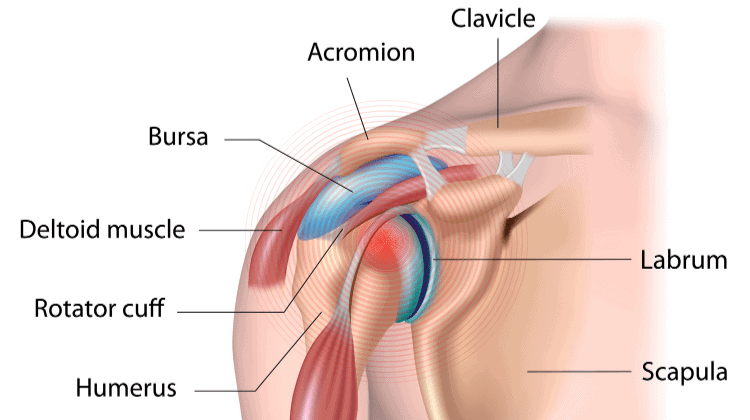Non-Surgical Shoulder Osteoarthritis Care In Tampa, FL
Regenexx procedures are non-surgical alternatives that use precise image-guided injections of your body’s own natural healing agents to treat shoulder injuries.
Shoulder arthritis impacts nearly 25% of adults, yet many of the other treatments still used today deliver less than ideal results. Research has shown that surgery is unreliable and that commonly used nonsurgical alternatives can do more harm than good. For example, steroids can break down cartilage1 and kill cartilage cells in arthritic joints.2

8600 Hidden River Pkwy.
Suite 700
Tampa, FL 33637
Request an Appointment
Call to Schedule Schedule OnlineClinic Hours
| Sunday | Closed |
| Monday | 8AM–5PM |
| Tuesday | 8:AM–5PM |
| Wednesday | 8AM–5PM |
| Thursday | 8AM–5PM |
| Friday | 8AM–5PM |
| Saturday | Closed |

Treating Shoulder Arthritis Without Surgery
Regenexx patients benefit from reduced pain and improved function, helping them avoid shoulder surgery.
Am I a candidate?Does Surgery Prevent Shoulder Arthritis?
A 2015 study looked at 100 shoulders 13 years after they were treated surgically. The research found that the operated shoulders had just as much arthritis as that reported by other studies in patients who didn’t get surgery.3
Moreover, shoulder replacement is a major surgery involving amputation of the shoulder joint and insertion of a prosthesis. Such an invasive surgery involves a long recovery time and the risk for serious complications. In addition, 40% of shoulder replacements in patients younger than 55 fail within 10 years.3
Regenexx Procedures for Shoulder Arthritis
Regenexx’s procedures for degenerative arthritis of the shoulder joint can be a better alternative for people looking to avoid surgery, lengthy recovery, and overuse of prescription pain medication. Best of all, Regenexx procedures spare normal body biomechanics helping you to remain active for your lifetime.
Patient FAQs
The cartilage in your shoulder is there to help reduce the friction in the joint and to cushion the bone. When cartilage starts to wear down or is injured by metabolic syndrome (i.e., overweight, high blood pressure, and high triglycerides), that’s called arthritis. It leads to chronic shoulder pain, stiffness, limited shoulder function, and decreased mobility.
What might surprise you is that it’s not the lost cartilage that causes the pain but rather the chemicals your body releases in response to inflammation.
Research suggests that those who have shoulder osteoarthritis before rotator cuff surgery for massive tears are at greater risk for retears and a much higher risk for progression of arthritis after surgery.(3) Additionally, a percentage of patients who don’t have shoulder arthritis prior to rotator cuff repair will develop it after the surgery.
When a bone begins to get spurs (osteophytes) — extra extensions of the joint that are your body’s reaction to instability — it is trying to stabilize the joint. So removing spurs is rarely a good idea
u003ch2u003eGet started to see if you are a Regenexx candidaternu003c/h2u003ernu003cpu003eTo talk one-on-one with one of our team members about how Regenexx may be able to help your orthopedic pain or injury, please complete the form below and we will be in touch with you within the next business day.u003c/pu003e
Regenexx is committed to your privacy. We do not sell or share your information to third party vendors. By submitting the form you agree that you’ve read and consent to our Privacy Policy.
How will we communicate with you and provide information about Regenexx? Text is available for quicker response. Message and data rates may apply. Frequency varies. Reply HELP for help, STOP to unsubscribe. We may also reach out via email, phone, or other electronic means.
What about health insurance or medical benefits? What may be covered or reimbursed depends on the details of your plan. Insurance typically covers evaluations and diagnostic testing (if recommended) but most do not cover Regenexx Procedures. Some Employer specific Regenexx Benefits plans do also cover Regenexx Procedures. Your plan’s representative can help verify your benefits, out-of-pocket costs, and coverage.
References
1. Murray RC, DeBowes RM, Gaughan EM, Zhu CF, Athanasiou KA. The effects of intra-articular methylprednisolone and exercise on the mechanical properties of articular cartilage in the horse. Osteoarthritis Cartilage. 1998 Mar;6(2):106-14. doi: 10.1053/joca.1997.0100. PMID: 9692065.
2. Nakazawa F, Matsuno H, Yudoh K, Watanabe Y, Katayama R, Kimura T. Corticosteroid treatment induces chondrocyte apoptosis in an experimental arthritis model and in chondrocyte cultures. Clin Exp Rheumatol. 2002 Nov-Dec;20(6):773-81. PMID: 12508768.
3. Plath JE, Aboalata M, Seppel G, Juretzko J, Waldt S, Vogt S, Imhoff AB. Prevalence of and Risk Factors for Dislocation Arthropathy: Radiological Long-term Outcome of Arthroscopic Bankart Repair in 100 Shoulders at an Average 13-Year Follow-up. Am J Sports Med. 2015 May;43(5):1084-90. doi: 10.1177/0363546515570621. Epub 2015 Mar 2. PMID: 25731974.
